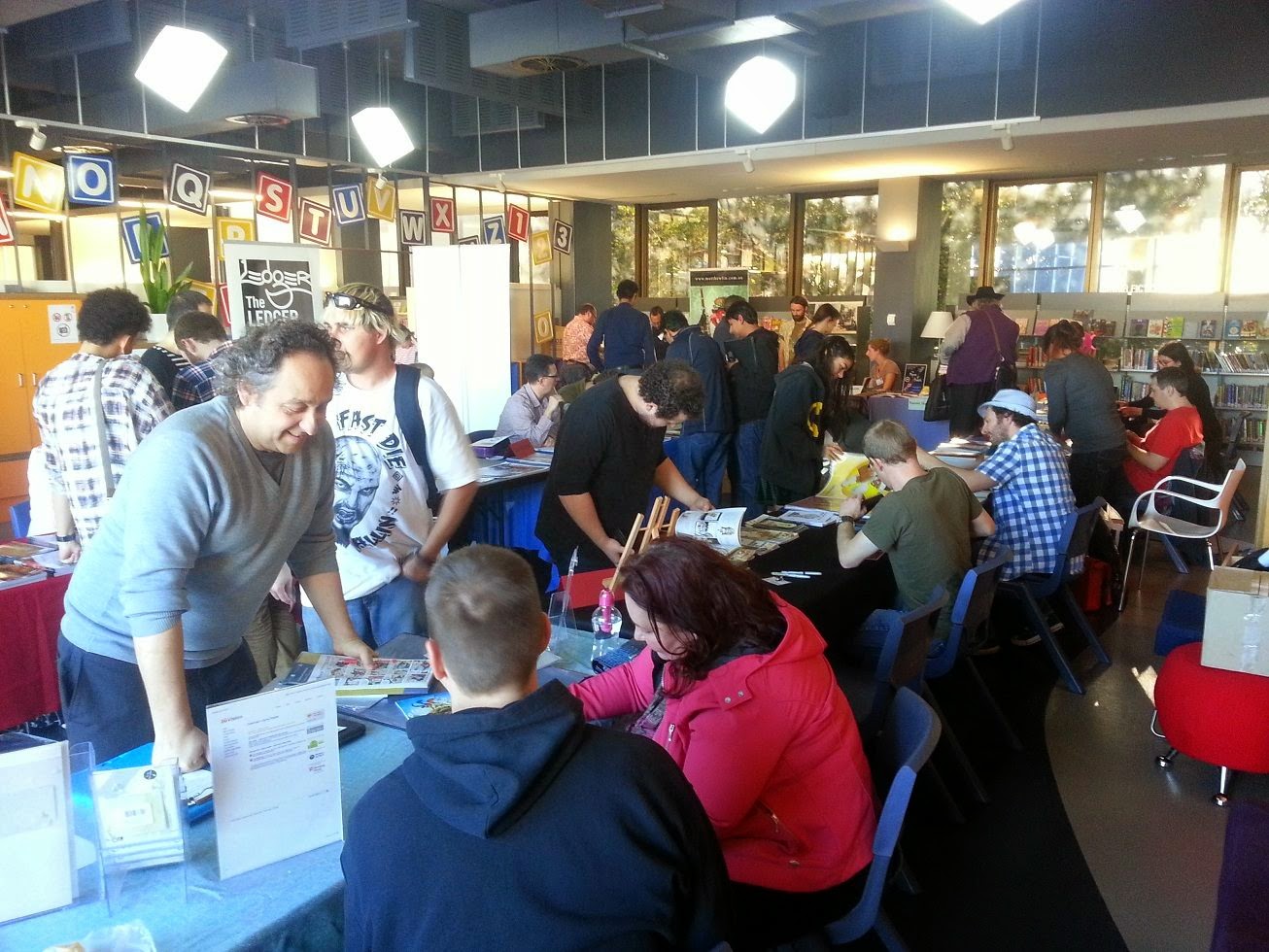 |
| Comic Conversations. Photo by Kings Comics. |
According to the Panel Session "Meet the Sydney Comics" Sydney has the most receptive and committed fan base for comics in Australia. The community is strong, and the digital connections across the globe are making it a reality for local creators to showcase their work to a global audience and work from Sydney or anywhere. Publishing on the web can help a budding creator to access their niche from a global audience, to grow in confidence and build technical skill, and maybe to move their work from a hobby to the next level. Comic artists working in Sydney are producing work for the big studios as well as their own independent publications. The Ledger Awards for comics in Australia have restarted after a hiatus, further supporting local creators. Australian based comic artists are getting in on the film/TV action as well. A comic created by Australian Tom Taylor, The Deep, is being turned into a 26 part CGI animation series for children by a French company.
 |
| Panel Discussion. Photo by Kings Comics. |
In the Panel Discussion "All Comics Great and Small" the panel also made the point that the literacy level of readers in this visual medium has also developed. Just like in any other form of expression, experiencing the classics develops literacy. Literacy turns into fluency. Chewie Chan commented that comics are more accessible, not because they are simpler, but because we are so well versed in visual language. This visual literacy can also be seen in other media such as the growth of infographics for data visualisation.
 |
| Workshop. Photo by Kings Comics. |
One future area of growth for the comic format is non-fiction works. The panel discussed the work being done, for example, in medical comics which explain medical conditions for patients, and others which educate doctors about their patient interactions. A conference is held each year at Johns Hopkins Medical Campus in Baltimore on this topic. There are plenty of other non-fiction works. The panel specifically mentioned Scott McClouds's Understanding Comics:The Invisible Art and Larry Gonick's Cartoon History of the Universe (and the other books in that series) as examples of how powerful comics can be in non-fiction/education. Schools for comics in Malmo, Sweden and upstate New York, USA, were noted as incubators for innovation and imagination, producing work that was admired by panellists.
"In a perfect graphic novel the prose and the drawing hold equal weight," says Chewie Chan. Learning this was the key change in my own enjoyment of comics. Being a reader of prose, I was reading through graphic novels in the same way, until I read an article about details hidden in one of the books I had been reading. I went back to find all these easter eggs and realised that I was really missing a big chunk of the story by racing through the drawings, and not giving them proper consideration. This is echoed too in the collaborations that develop between writers and illustrators to develop comics, as some start as storytellers, and have to develop drawing skills or vice versa. Some comics are the work of an individual, but many are the work of teams, each contributing their strengths. Also, the panel noted that in this format, the reader actually does a lot of the work, almost to the point of being a co-creator. Because the story moves from panel to panel, the reader has to fill in the "gutter" between the images with their own contribution.
 |
| Graphic Novels. Photo by Kings Comics. |
Thanks to them for running this event, I really hope it becomes an annual fixture.
Want to find out more about comics and graphic novels?
Kings Comics in Sydney has a You Tube channel, featuring the Kapow Comic Book Show.
Geek Actually has a comics podcast Behind The Panels
Panels is a Book Riot spin off on Facebook, although not local, very interesting.
Take a look at Comics For a Cause where you can donate old comics to adult and teen literacy schemes and ESL centres.
Comics on Halloween coming up soon at Liverpool Library
-Lauren Castan




